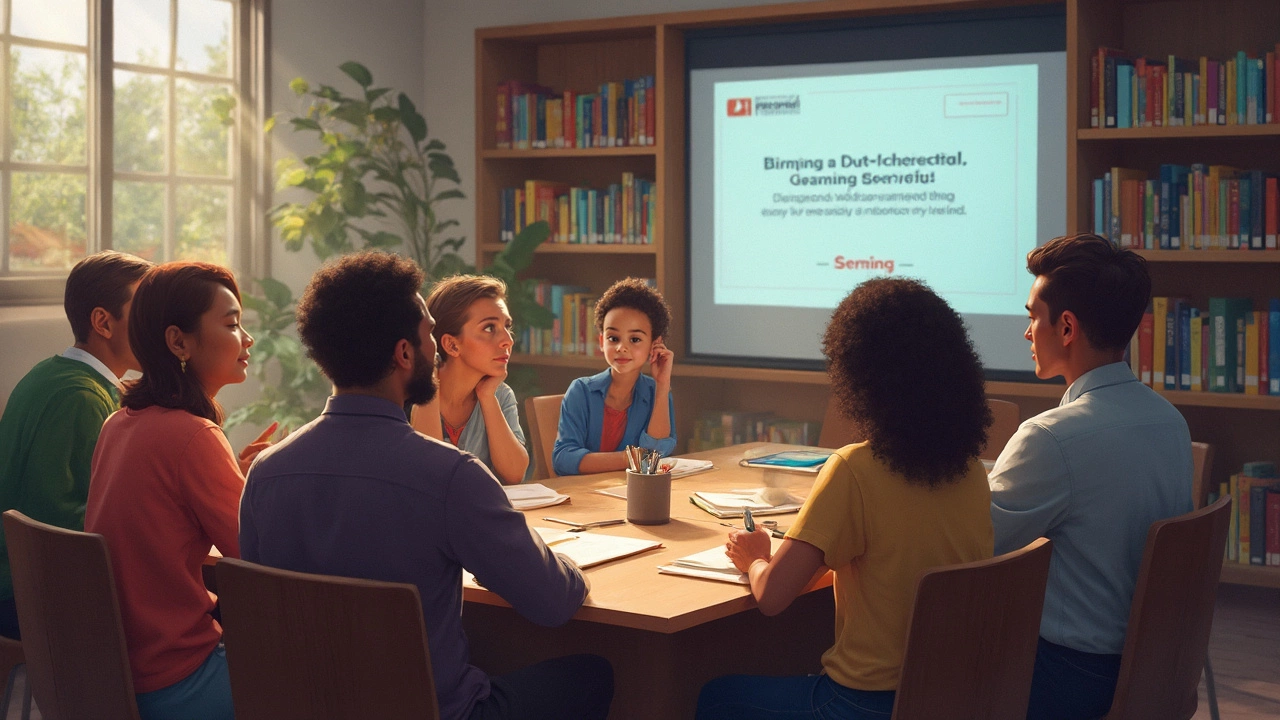Adult learning is a whole different ballgame compared to what we remember from school. It's like shifting gears from a tricycle to a car. Why? Because adults learn differently. They're not just empty sponges waiting to be filled but come with their own set of experiences, opinions, and yes, sometimes a bit of stubbornness.
What's the biggest twist? Adults are often self-directed learners. Think of it as being your own boss, choosing what matters to you, and setting your own pace. It's about hitting the books—or YouTube tutorials—when you feel most ready. Not too shabby, huh?
Another cool thing: adults thrive on experiential learning. You know how it feels when you finally understand something after getting your hands dirty? Whether it's mastering a hobby or learning new work skills, adults often prefer to dive in headfirst, making mistakes along the way, and learning from them. It's not just about getting info; it's about living it.
- The Nature of Adult Learning
- Self-Directed Learning
- Experiential Learning
- The Role of Motivation
- Challenges in Adult Education
- Tips for Effective Adult Learning
The Nature of Adult Learning
So, what exactly sets adult learning apart? For starters, adults bring a rich tapestry of life experiences and old knowledge to their learning process. You know that feeling when you finally get why school math is useful when calculating your bills or fixing something at home? That's adults using past experiences to shape new learning.
Unlike kids, adults usually juggle multiple roles—think worker, parent, community volunteer—all of which influence what and how they learn. Because of these roles, education isn't just a box to check off; it's often geared towards immediate application. And let's be real, who wouldn't prefer learning something they can use right away?
Adults also crave practical learning. They want stuff that ties directly into their job or personal interests. They often ask, "How can I apply this now?" This practicality is at the heart of being an adult learner. Another factor is motivation. It's typically intrinsic, like the desire to advance in a career or master a hobby.
Now, some mind-blowing stats for you. A recent study found that about 83% of adult learners prefer flexible learning options, such as online courses or night classes. Here's a fun table to show the key motivational factors for adult learning:
| Motivational Factor | Percentage |
|---|---|
| Career Advancement | 40% |
| Personal Interest | 30% |
| Skill Development | 20% |
| Social Interaction | 10% |
This table gives you an idea of what's driving adult learners these days. Notice how career and personal interest top the list. It pretty much proves the point that adults are learning with a purpose.
Self-Directed Learning
Self-directed learning is like being the captain of your own ship. Adults in the realm of adult learning often choose this path because it allows them to tailor their educational journey to fit their lives, and honestly, who doesn't want that flexibility?
So, what exactly is self-directed learning? It means taking the reins and planning your educational path. You're setting your own goals, picking the materials you think will help, and deciding how you'll assess your progress. It's pretty much about trusting your instincts and knowing what's best for your learning style.
Here are some nifty steps to get started with self-directed learning:
- Identify your goals. Ask yourself, "What do I really want to learn or improve?"
- Assess your current skills. Where are you at now, and where do you need to be?
- Find resources. Look for books, courses, podcasts, or any kind of materials that resonate with your learning preferences.
- Create a schedule. Set reasonable timelines and stick to them—life happens, but having a game plan helps.
- Evaluate your progress. Take time to review what you've learned and whether it's meeting your goals.
According to a study by the National Center for Education Statistics, about 73% of adults engage in some kind of informal learning activity each year. So, if you're diving into self-directed learning, you're in good company!
The advantage? You get to learn anything, anytime, anywhere. It turns learning from a chore into something exciting and personal. Just remember, being self-motivated is the key, along with the willpower to keep the momentum going, especially when life gets in the way.
Experiential Learning
Ever heard the saying, "Learn by doing"? That's what experiential learning is all about. It's like taking knowledge out of the textbook and getting a real-world feel for it. This method is super effective for adults because it connects learning with action. You're not just memorizing facts; you're applying them, making the whole thing stick much better.
Here's how it typically works: instead of just sitting through a lecture, you might dive into a hands-on project or role-playing scenario. Think of workshops where you actually tackle problems or internships where you're smack dab in the middle of real tasks. This active participation helps cement what you've learned because you're experiencing it firsthand.
One of the big names in this field, David Kolb, describes this as a cycle involving four stages: concrete experience, reflective observation, abstract conceptualization, and active experimentation. Pretty fancy, huh? But it's just saying you try something, think about it, learn from it, and then give it a whirl again with new insights.
For those digging into adult education, adopting experiential approaches can be a game-changer, especially in areas like vocational training or business courses. Employers love it, too, because it means their staff isn't just learning in theory; they're ready to rock 'n' roll with real skills.
And here's a cool fact: organizations often report that experiential learning enhances retention rates. In one study, learners retained 75% of what they practiced compared to only 5% from traditional lectures. That's a pretty solid reason to dive into experiences rather than just books or slideshows!
If you want to boost your learning, here are a few ways to incorporate experiential methods:
- Join workshops or boot camps where you can roll up your sleeves.
- Volunteer for projects that push you outside your comfort zone.
- Seek mentoring opportunities where you can practice skills with guidance.
- Engage in simulations that mimic real-world scenarios.
By mixing experiential learning into your routine, you're not just boosting your knowledge—you're making it truly come alive.

The Role of Motivation
When it comes to adult learning, motivation is like the fuel that keeps the engine running. Unlike kids who often follow a school schedule because they have to, adults usually dive into education because they want to. Whether it's climbing the career ladder, pursuing a passion, or just brushing up on new skills, there's often a strong 'why' behind adult learners hitting the books.
Sure, getting motivated is easier said than done. But it's all about figuring out what really makes you tick. Financial incentives are a big one—higher education can lead to better job prospects and higher pay. But it's not just about the paycheck. Many adults learn to gain a sense of achievement, personal satisfaction, or just for the love of learning. There’s a feeling of empowerment in mastering something new.
Research even backs this up. Studies show adults are more engaged and retain information better when they're genuinely interested in the subject. So, finding that personal connection or real-world relevance in what you're learning can make all the difference. It's almost like having a cheat code for your brain!
Keeping motivation strong isn't just about having a goal. It also helps to have a supportive learning environment. Being around like-minded folks or having a mentor can boost your spirits when things get tough. Plus, setting short-term goals can turn a big, scary learning journey into bite-sized pieces, making your progress easier to manage—and celebrate.
So, if you're thinking about jumping back into the learning pool, ask yourself: what's your 'why'? Understanding your true motivations can be the key to unlocking your lifelong learning potential and making the process way more enjoyable.
Challenges in Adult Education
Adult learning is a rewarding journey, but it's not a walk in the park. It's more like climbing a hill with a backpack full of responsibilities. So, what's in that backpack? Let's unpack some common hurdles.
Time Management: Adults often juggle jobs, families, and social lives, squeezing education into an already crowded schedule. It's not unusual to find adults learning late at night after putting the kids to bed or during lunch breaks.
Tech Know-How: The digital age has revolutionized learning, but not everyone is tech-savvy. Many adults face a steep learning curve when it comes to online courses and digital resources.
Financial Strain: Education can be costly, and many adults can't afford to pause work to study full-time. Financial worries can stifle the eagerness to enroll in courses that lead to career advancement.
"The best way to predict your future is to create it." – Peter Drucker
Drucker's words ring especially true for adults who are willing to push through these barriers to unlock better opportunities.
Motivation and Focus: Staying motivated isn't always easy, especially when progress feels slow. Adults must often remind themselves of their goals and why they started in the first place.
| Challenge | Obstacles |
|---|---|
| Time Management | Balancing education with personal and work life |
| Tech Know-How | Lack of digital skills |
| Financial Strain | High cost of courses and materials |
| Motivation | Maintaining focus amidst slow progress |
So, how can adults navigate these obstacles? Here are some tips:
- Set realistic schedules and stick to them.
- Use free online resources to improve tech skills.
- Explore scholarships or employer sponsorships for financial aid.
- Keep your eyes on the prize. Regularly revisit your goals.
While the path may be paved with challenges, the journey is worthwhile. Each small step forward is a step towards something bigger.
Tips for Effective Adult Learning
Navigating the world of adult learning can feel like jumping into a new adventure. It's not just about hitting the books after dinner; it's about finding what really works for you. Here are some handy tips to make your learning journey smoother and more rewarding.
First off, set clear goals. Knowing why you're learning something fuels motivation. Is it for career growth, personal interest, or a new hobby? These goals will keep you focused when Netflix is calling your name.
Also, embrace technology. There are countless apps and online platforms that offer free or affordable resources. Platforms like Coursera and Khan Academy have courses tailored for adults who are balancing work, life, and learning.
Don’t forget the power of experiential learning. If you can, try to apply what you learn in real-life situations. It helps cement the knowledge way better than just reading or watching alone.
- Lifelong learning isn't just a buzzword. It's a mindset. Keep expanding your horizon with new topics, even unrelated ones. You'd be surprised how often skills from one area can help in another.
- Stay connected. Reach out to peers or join online forums. Learning with others makes the journey enjoyable and you're more likely to stick to it. Plus, explaining concepts to others can clarify your understanding.
Lastly, be patient with yourself. Adults learn differently from younger students. If progress feels slow, don't sweat it. Every little step is a step forward. And hey, as someone once said, “Mistakes are proof that you’re trying.”

